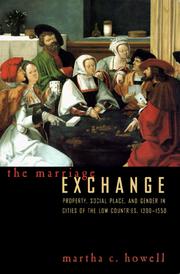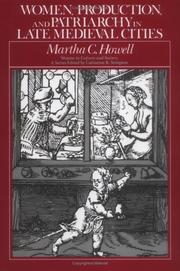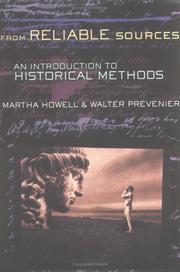| Listing 1 - 8 of 8 |
Sort by
|

ISBN: 0226355160 0226355152 9780226355160 Year: 1998 Volume: *33 Publisher: Chicago (Ill.) : University of Chicago press,
Abstract | Keywords | Export | Availability | Bookmark
 Loading...
Loading...Choose an application
- Reference Manager
- EndNote
- RefWorks (Direct export to RefWorks)
Based on extensive research in this archive, this book reveals how these documents were produced in a centuries-long effort to regulate --and ultimately to redefine-- property and gender relations. At the center of the transformation was a shift from a marital property regime based on custom to one based on contract. In the former, a widow typically inherited her husband's property; in the latter, she shared it with or simply held it for his family or offspring. Howell asks why the law changed as it did and assesses the law's effects on both social and gender meanings but she insists that the reform did not originate in general dissatisfaction with custom or a desire to disempower widows. Instead, it was born in a complex economic, social and cultural history during which Douaisiens gradually came to think about both property and gender in new ways. Medieval Douai was one of the wealthiest cloth towns of Flanders, and it left an enormous archive documenting the personal financial affairs of its citizens --wills, marriage agreements, business contracts, and records of court disputes over property rights of all kinds.
History of the Low Countries --- anno 1400-1499 --- anno 1500-1599 --- anno 1300-1399 --- Droit médiéval --- Law [Medieval ] --- Medieval law --- Middeleeuws recht --- Recht [Middeleeuws ] --- Husband and wife --- Marital property --- Law, Medieval --- History --- History. --- Law, Medieval. --- #VCV monografie 1999 --- Droit médiéval --- anno 500-1499 --- France --- Matrimonial property --- Property, Marital --- Property --- Man and wife --- Matrimonial regime --- Spouses --- Wife and husband --- Domestic relations --- Women --- Desertion and non-support --- Marriage law --- Married women --- Law and legislation --- Legal status, laws, etc. --- Flanders (County) --- Douai (France) --- Marital property - Flanders - History --- Husband and wife - Flanders - History --- Marital property - France - Douai - History --- Husband and wife - France - Douai - History --- HUWELIJKSLEVEN -- 930.347 --- MIDDELEEUWEN -- 930.347 --- MODERNE TIJDEN -- 930.347 --- HUWELIJKSLEVEN -- 930.348 --- MIDDELEEUWEN -- 930.348 --- MODERNE TIJDEN -- 930.348 --- MODERNE TIJDEN -- 930.32 --- Marriage --- Matrimonial law --- Book --- Property rights --- Inheritance law
Book
ISBN: 9780521760461 9780521148504 0521760461 0521148502 Year: 2010 Publisher: Cambridge: Cambridge university press,
Abstract | Keywords | Export | Availability | Bookmark
 Loading...
Loading...Choose an application
- Reference Manager
- EndNote
- RefWorks (Direct export to RefWorks)
History of Europe --- anno 1400-1499 --- anno 1500-1599 --- anno 1300-1399 --- Commerce --- History --- Europe --- Commerce. --- Commerce - History - Medieval, 500-1500 --- Commerce - History - 16th century --- Europe - Commerce --- Rites et cérémonies du mariage médiévaux --- Rites et cérémonies du mariage --- Dot --- Moyen âge --- 16e siècle --- Conditions économiques --- Conditions sociales

ISBN: 0226355039 0226355047 9786612189241 1282189247 0226355063 9780226355030 9780226355047 9781282189249 9780226355061 Year: 1986 Publisher: Chicago : University of Chicago Press,
Abstract | Keywords | Export | Availability | Bookmark
 Loading...
Loading...Choose an application
- Reference Manager
- EndNote
- RefWorks (Direct export to RefWorks)
In this bold reinterpretation of Women's changing labor status during the late medieval and early modern period, Martha C. Howell argues that women's work was the product of the intersection of two systems, one cultural and one economic. Howell shows forcefully that patriarchal family structure, not capitalist development per se, was a decisive factor in determining women's work. Women could enjoy high labor status if they worked within a family production unit or if their labor did not interfere with their domestic responsibilities or threaten male control of a craft or trade.
#SBIB:316.346H22 --- #SBIB:94H0 --- #SBIB:39A72 --- 396 <09> "14" --- Cities and towns, Medieval --- Patriarchy --- -Women --- -Medieval cities and towns --- Human females --- Wimmin --- Woman --- Womon --- Womyn --- Females --- Human beings --- Femininity --- Androcracy --- Patriarchal families --- Fathers --- Families --- Male domination (Social structure) --- Patrilineal kinship --- 396 <09> "14" Geschiedenis van het feminisme. Vrouwengeschiedenis--?"14" --- Geschiedenis van het feminisme. Vrouwengeschiedenis--?"14" --- Positie van de vrouw in de samenleving: arbeid en beroep --- Geschiedenis van Europa: algemeen --- Etnografie: Europa --- History --- Employment --- -History --- -#SBIB:316.346H22 --- -Cities and towns, Medieval --- Women --- Medieval cities and towns --- Employment&delete& --- History of Europe --- anno 500-1499 --- Cities and towns, Medieval. --- History. --- Patriarchaat [Sociologie]. Europa (West-). 1300-1500. --- Femmes. Travail. Europe occidentale. 1300-1500. --- Patriarcat [Sociologie]. Europe occidentale. 1300-1500. --- Vrouwenarbeid. Europa (West-). 1300-1500.
Book
ISBN: 9782503547848 9782503548227 2503547842 Year: 2013 Volume: 30 Publisher: Turnhout: Brepols,
Abstract | Keywords | Export | Availability | Bookmark
 Loading...
Loading...Choose an application
- Reference Manager
- EndNote
- RefWorks (Direct export to RefWorks)
This volume examines the politics of space in the most densely urbanized areas of Europe during the late Middle Ages and Renaissance. It ranges from Italy to the Parisian region and then to the greater Low Countries, home of Europe’s most powerful commercial cities of the period. Hardly inert sites on which political action took place, the spaces these authors investigate conferred power on those who possessed them. At the same time they were themselves transformed by the struggles, thus acquiring new powers that invited future contest. Thus implicitly responding to Georges Lefebvre’s claim that space is “produced”, the authors ask how space was perceived and used in everyday life, giving specific spaces cultural, social, and political coherence (“le perçu”); how it was represented or theorized, thus encoded in symbols, maps and laws (“le conçu”); and how it was lived, in effect the result of the dialectical relation between the perceived and the represented (“le vécu”).
History of Europe --- anno 1100-1199 --- anno 1200-1799 --- France: North --- Belgium --- Netherlands --- Italy --- Cities and towns, Medieval --- Middle Ages --- Villes médiévales --- Moyen Age --- Congresses. --- Congrès --- Villes --- Sociologie urbaine --- Géographie urbaine --- Aspect social --- Actes de congrès --- Villes médiévales --- Congrès --- Cities and towns --- History --- Middle Ages, 500-1500 --- France [Northern ] --- Benelux countries --- Geschiedenis van Europa --- Frankrijk: Noord --- Italië --- Nederland --- België --- Actes de congrès. --- City planning --- Urbanization --- Cities and towns, Movement to --- Urban development --- Urban systems --- Social history --- Sociology, Rural --- Sociology, Urban --- Urban policy --- Rural-urban migration --- Civic planning --- Land use, Urban --- Model cities --- Redevelopment, Urban --- Slum clearance --- Town planning --- Urban design --- Urban planning --- Land use --- Planning --- Art, Municipal --- Civic improvement --- Regional planning --- Urban renewal --- Growth, Urban --- Sprawl, Urban --- Urban growth --- Urban sprawl --- Migration, Internal --- Population --- Vital statistics --- Growth --- Government policy --- Management

ISBN: 0801435730 0801485606 9780801435737 9780801485602 Year: 2001 Publisher: Ithaca (N.Y.): Cornell university press,
Abstract | Keywords | Export | Availability | Bookmark
 Loading...
Loading...Choose an application
- Reference Manager
- EndNote
- RefWorks (Direct export to RefWorks)
From reliable sources is an introduction to historical methodology, an overview of the techniques historians must master in order to reconstruct the past. Its focus is on the basics of source criticism and is a guide for all students of history and for anyone who must extract meaning from written and unwritten sources. Martha Howell and Walter Prevenier explore the methods employed by historians to establish the reliability of materials; how they choose, authenticate, decode, compare, and, finally, interpret those sources. Illustrating their discussion with examples from the distant past as well as more contemporary events, they pay particular attention to recent information media, such as television, film, and videotape. The authors do not subscribe to the positivist belief that the historian can attain objective and total knowledge of the past. Instead, they argue that each generation of historians develops its own perspective, and that our understanding of the past is constantly reshaped by the historian and the world he or she inhabits.
History --- Historiography. --- Methodology. --- Research. --- Philosophy. --- Art --- Histoire --- Historiographie. --- Méthodologie. --- Philosophie. --- Recherche. --- Historiography --- Historical research --- History, Modern --- Historical criticism --- Authorship --- Methodology --- Philosophy --- Research --- Criticism --- History - Methodology. --- History - Research. --- History - Philosophy. --- HISTOIRE --- HISTORIOGRAPHIE --- METHODOLOGIE --- GUIDES, MANUELS, ETC. --- RECHERCHE --- Philosophie
Book
ISBN: 9789044110777 9044110772 Year: 2000 Publisher: Leuven Garant
Abstract | Keywords | Export | Availability | Bookmark
 Loading...
Loading...Choose an application
- Reference Manager
- EndNote
- RefWorks (Direct export to RefWorks)
08
History as a science --- 930.22 --- 900 Geschiedenis --- #KVHA:Historische kritiek --- #KVHA:Bronnenonderzoek --- #KVHA:Geschiedenis --- Informatiebronnen (gegevensbanken) --- 901 --- Historische bronnen --- Historische kritiek --- 930.22 Bronnenstudie. Oorkondenleer. Diplomatiek --- Bronnenstudie. Oorkondenleer. Diplomatiek --- Geschiedeniswetenschap --- 001 --- 930.23 --- Wetenschappelijk onderzoek --- Wetenschappelijk werk --- Historiography --- History --- Methodology --- Geschiedenis --- Geneeskunde --- Techniek (wetenschap) --- Atlas --- Museum --- History - Methodology
Book
Year: 2000 Publisher: Leuven: Garant,
Abstract | Keywords | Export | Availability | Bookmark
 Loading...
Loading...Choose an application
- Reference Manager
- EndNote
- RefWorks (Direct export to RefWorks)
Book
ISBN: 9462983720 9789462983724 9789048534098 Year: 2019 Publisher: Amsterdam: Amsterdam university press,
Abstract | Keywords | Export | Availability | Bookmark
 Loading...
Loading...Choose an application
- Reference Manager
- EndNote
- RefWorks (Direct export to RefWorks)
This edited volume is a reappraisal of the legacy and historiographical impact of Johan Huizinga's 1919 masterwork for the centenary of its publication in the field of medieval history, art history, and cultural studies
History as a science --- History of Europe --- Huizinga, Johan --- anno 1200-1499 --- Civilization, Medieval --- Medieval civilization --- Middle Ages --- Civilization --- Chivalry --- Renaissance --- History --- Huizinga, Johan, --- France --- Netherlands --- Civilization. --- Critique --- --Moyen âge, --- Historiographie --- --Civilization, Medieval --- Huizinga, Johan, 1872-1945. --- Moyen âge, 476-1492 --- Huizinga, Johan, - 1872-1945. - Herfsttij der Middeleeuwen --- Huizinga, Johan, 1872-1945 --- France - Civilization - 1328-1600 --- Netherlands - Civilization
| Listing 1 - 8 of 8 |
Sort by
|

 Search
Search Feedback
Feedback About UniCat
About UniCat  Help
Help News
News